Menopause in the Workplace

Executive Summary
2019 saw an increasing media and political focus on supporting menopausal individuals in the workplace, including Labour pledging to make menopause policies obligatory.
In April 2019, research commissioned by Health & Her revealed that 14 million working days were lost annually due to menopause symptoms with a further 370,000 menopausal people reporting that they considered resigning.
Given that the symptoms of menopause often result in misdiagnosis, the figures are likely to be much higher.
Productivity and talent is being lost because of lack of understanding and support.
If talent is lost at the latter stage of an individual’s career, this will also likely increase an organisation’s gender pay gap at a time when the majority of businesses are working hard to close the gap.
Recognising workplace retention in the age category who are likely to suffer menopause symptoms (45-55) is a business imperative. We hosted a series of roundtable discussions to explore how best to tackle the problem. The results were fascinating.
The purpose of this paper is to share these findings with you, which we hope will assist you in devising your own workplace strategy.
Several key themes emerged from the roundtables:
- raising awareness among all staff of the potential symptoms and effects of the menopause was considered the most effective way to support women, trans and non-binary individuals and normalise menopause discussions in the workplace;
- a preference towards raising menopause awareness and support as part of a wider wellbeing initiative, rather than a specific diversity and/or inclusion initiative; and
- general workplace policies, such as agile and flexible working, could greatly assist menopausal individuals without singling out that they were going through the menopause.

Mandy Laurie
Head of Employment
e mandy.laurie@burnesspaull.com
t +44 (0)131 473 6318
m +44 (0)7507 766 288



Part 1
RAISING AWARENESS



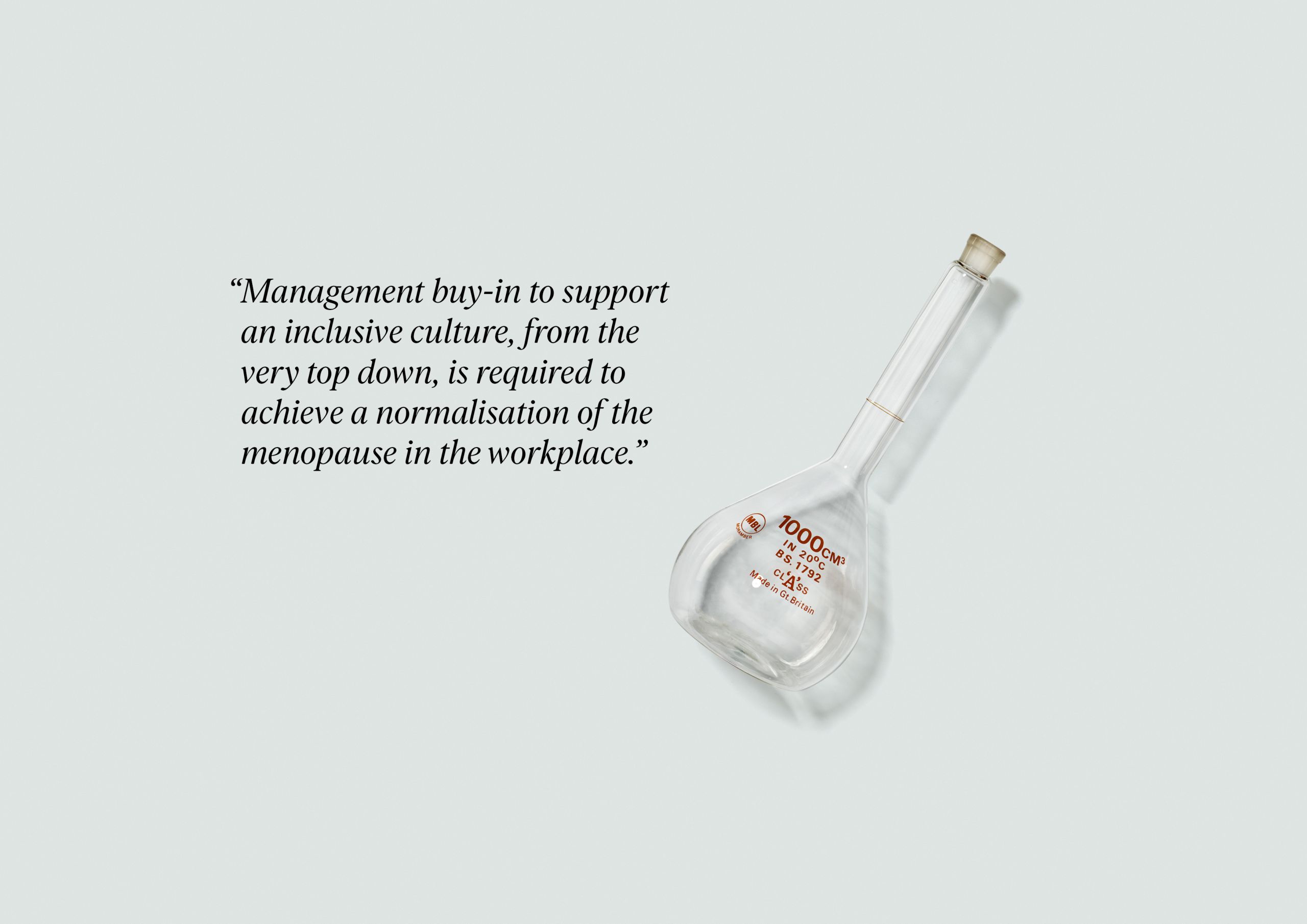


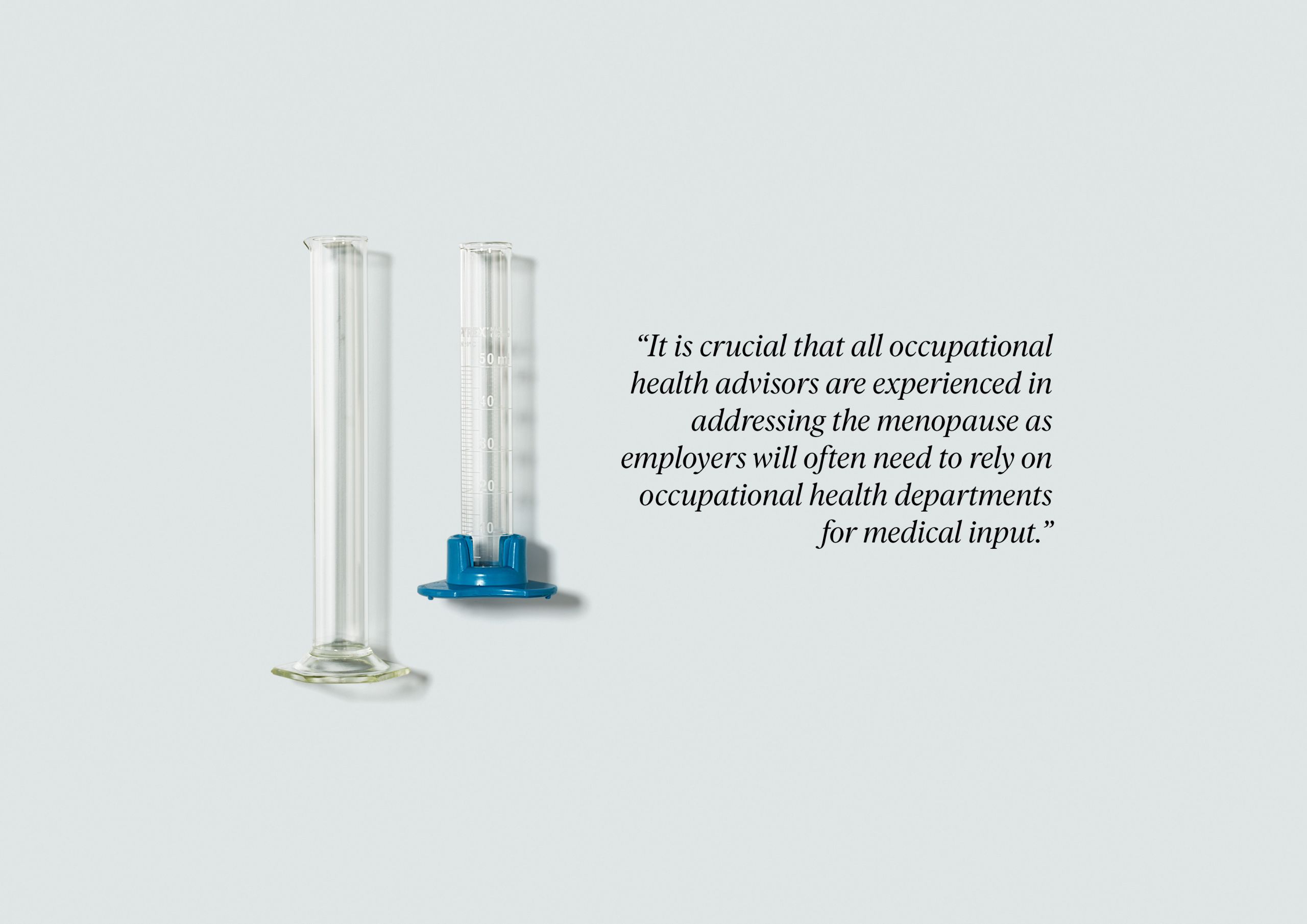

Impact on individuals
The symptoms of the menopause are wide ranging and can include fatigue, anxiety, mental health issues, hot flushes, insomnia, migraines and physical body aches. The menopause does not affect every person in the same way and people may attempt to control their symptoms by different means; whether that be medication, dietary or herbal remedies.
Often a person will not know that they are going through the menopause (or the perimenopause, the transitional phase before the occurrence of the menopause) as their symptoms may be misdiagnosed or they may experience very few symptoms. At the other end of the spectrum, some individuals believe that they are experiencing the onset of dementia due to the memory loss they encounter.
Menopause can have a real and significant impact.
Participants discussed real life examples of employees being absent from work due to the effects of the menopause. There were other interesting examples of where HR’s knowledge of the menopause helped employees to identify that the menopause was the cause of their symptoms. For those that do not identify as women, the menopause can cause additional challenges as the notion that the menopause only affects ‘women over a certain age’ makes it difficult for those individuals to raise the issue or ask for adjustments. It is clear from our conversations that with the right knowledge, businesses can offer real and meaningful support to menopausal people at work.
Starting the conversation
All participants agreed that there was an undisputable business need to raise awareness of the menopause. Awareness of the issue is not only crucial to a person’s wellbeing generally, but also to ensuring that they obtain the right support in work and employers avoid loss of work days, productivity and in worse case scenarios, talent. This raises the question, how do you, for the benefit of menopausal people, and the business, bring the matter out into the open?
Who is the best person to have awareness of menopause symptoms? It was acknowledged that many line managers would welcome the opportunity to learn and support their staff in order to get the best out of their team and may be best placed to spot people in need of support, however the employee may not feel comfortable approaching them. If an employee was to indicate that they were suffering from menopausal symptoms during a one to one, then managers should know how to best handle that conversation and how to make it meaningful.
There were differing views on whether HR were best placed to have the awareness of menopause symptoms. Some felt it should not be an HR specific role as it was important that all staff felt able to identify colleagues in need of support and discuss the menopause, whereas others felt that employees may feel more able to confide in HR and that HR are best placed to have sensitive conversations.
Menopause mentor - a mentor too far?
The idea of a menopause mentor was discussed, someone who had knowledge of menopause symptoms and could be available to speak to individuals who needed support. However, overall there was reluctance to have a specific menopause mentor role.
It was recognised that individuals will often not want to be singled out specifically as going through the menopause and suffering from symptoms for a number of reasons. Such reasons may include fear of being “written off” in the organisation or indeed their own lack of understanding or education on the topic.
It was also noted that there are various initiatives already in place in businesses such as Mental Health First Aiders and Equality Champions and that it was perhaps best to avoid having another specific mentor when businesses were unsure how well that role would be received.
Overall, participants agreed that raising awareness for all staff of the menopause and its symptoms, similar to how employers are raising awareness and support in respect of mental health, was the best way to help all staff recognise, understand and support individuals going through the perimenopause or the menopause.
Training on its own is often not the best means of raising awareness, as training only works if all staff attend. Organisations may wish to consider compulsory training for management and HR, as well as including information regarding menopause in newsletters or displaying information at coffee points to help to ensure that all staff have some menopause awareness.
It is unlikely that raising awareness alone would provide a solution.
One of the main difficulties is that there is still a stigma around “the menopause” with some individuals being worried that they will be “written off” if they admit that they are going through it, or some may be in denial that they are at that age or stage of life and not wish to discuss it.
Creating an inclusive culture, where people suffering from the menopause are recognised and supported with no stigma, is required.
Management buy-in to support that culture, from the very top down, is required to achieve a normalisation of the menopause in the workplace.
Where does menopause fit in the workplace?
There was a lively debate around whether the matter should be considered as part of an employer’s health and wellbeing or diversity and inclusion initiatives. While some participants felt that diversity and inclusion was the necessary and appropriate place for menopause discussions to take place, others felt that making it a gender specific issue was a major turn-off, not only for the people experiencing the menopause but also for colleagues and line management.
That feeling may stem from a lack of education around the menopause but also the people themselves feeling that the menopause was not something that they care to openly discuss or have marked as a gender specific matter which needs support. Raising awareness as part of a diversity and/or inclusion policy may also lead to stigma or result in a focus on what women, trans men and non-binary people may not be able to do rather than what they could offer during that stage in their life.
Regard was had to the fact that it was called menopause for a reason. The pause meaning that the menopause could be for a very temporary period and the extent of symptoms are highly variable between each individual. Therefore, to label the menopause under a gender specific diversity and/or inclusion agenda did not necessarily grapple with the varying degrees that the menopause could cover.
It was also discussed that between the ages of 40 to 50, the age period for people about to embark on the perimenopause, mental health issues were not just limited to women, transgender men or some non-binary people. Statistically, men’s vulnerability in this age group is also heightened with increased rates of suicide.
A broader approach to health and wellbeing of all genders could be very beneficial for workers and assist with enhancing business offerings. For example, those over 40 regardless of gender could be offered a general ‘health MOT’. Within that, there could be specific discussion with health advisors for needs as determined by the individual, with an increased focus on mental health.
Employers would have to be able to justify the offering, otherwise there could be a risk of indirect age discrimination claims if only offered to a certain age group. Whilst this benefit would clearly cost an employer, it is perhaps a realistic and enhancing benefit to workers that could save a business money.
Health MOTs could assist with identifying support and adaptation for the workplace at an early stage, and avoid management time being taken up with formal processes if matters are left to fester. It could also help with morale and staff retention. More importantly, it could help to improve workers’ health and wellbeing and avoid absence.
The role of medical professionals
Menopause can be difficult to diagnose and often individuals are misdiagnosed as suffering from, for example, depression, when actually the symptoms were menopause related. Participants felt that this was an area that occupational health specialists could be fully trained in, offering a service to employers to train and support their workforce.
It is crucial that all occupational health advisors are experienced in addressing the menopause as employers will often need to rely on occupational health for medical input. Employers may also offer employee assistance programmes and should ensure those offering support as part of that service are able to recognise and understand the menopause and its symptoms too.
The right medical input can be crucial for employers if, for example, an employee is absent from work or struggling with their performance. However, it was recognised that referral to occupational health, particularly at a certain age and stage of life, may be seen by the employee as ominous and be met with resistance.
Therefore, the general preference remained a more proactive but invested approach to the health and wellbeing of individuals at this stage of their lives across all genders, but participants recognised that if an individual was struggling, occupational health have a key role to play.

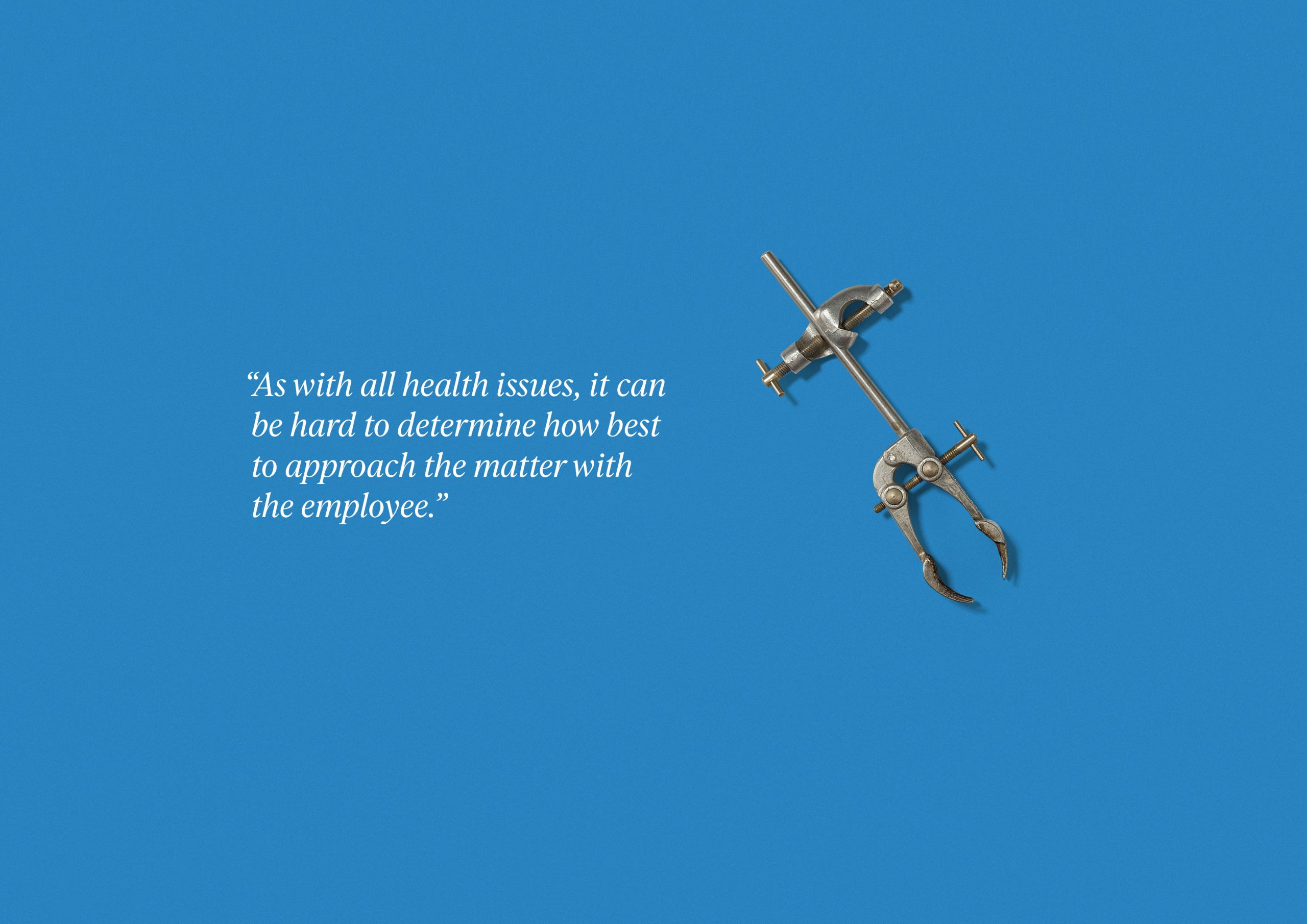
Part 2
GUIDING YOU THROUGH
THE MENOPAUSE


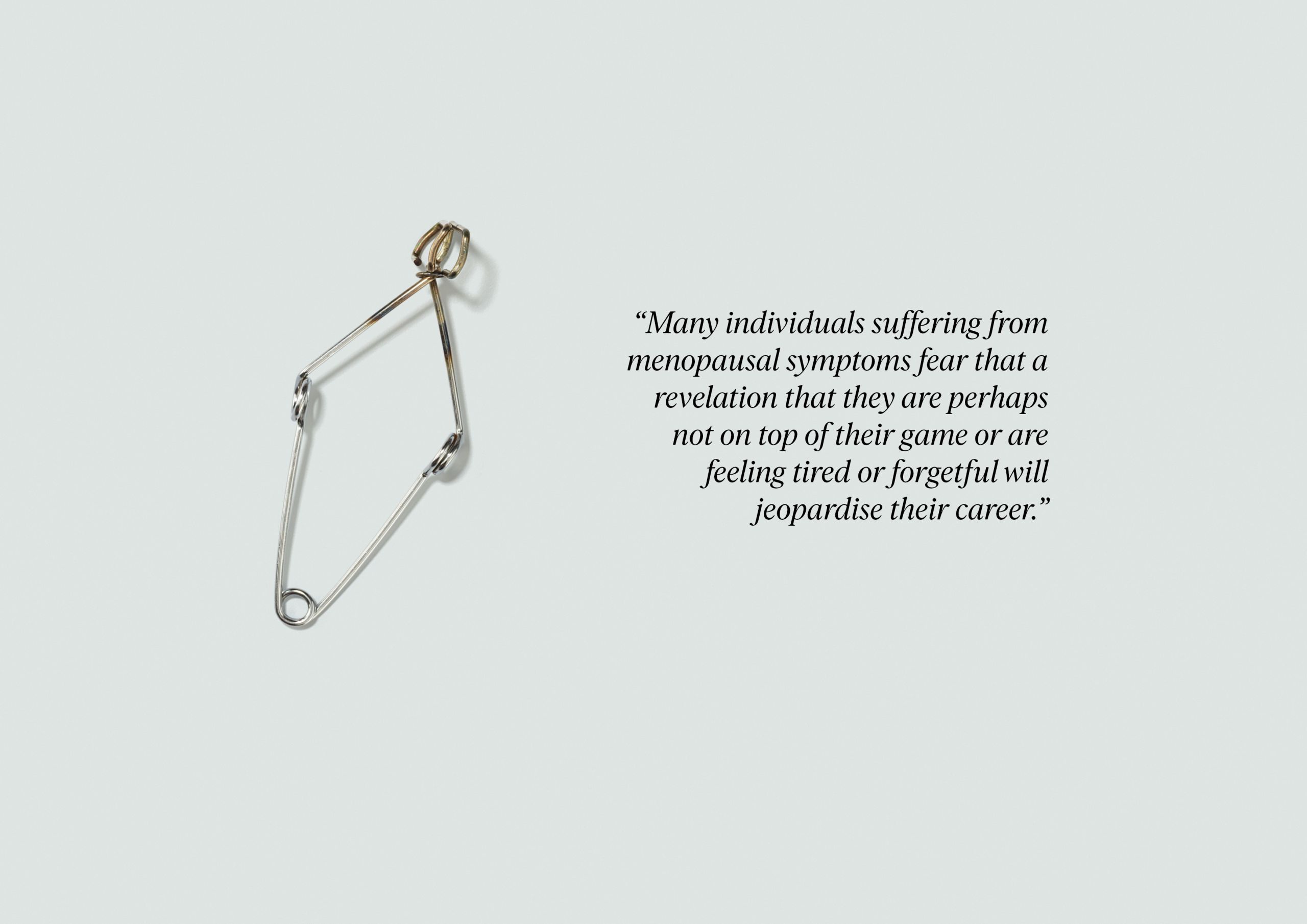


Available guidance
It was noted that there was a recent wealth of information and guidance available for employers on menopause policies and adjustments that could be carried out. However, most of the guidance was quite generic and often not practical in the approach to be taken in assessing if an individual was going through the menopause or how discussions, which could be extremely sensitive, should take place.
As with all health issues, it can be hard to determine how best to approach the matter with the employee.
Often humour can help embarrassment and perhaps encourage the individual to open up about the symptoms that they are suffering from, but equally, belittling something which can make someone seriously unwell can only serve to denigrate any good efforts by the employer in bringing the condition to the fore and supporting the individual.
Reference was made to a number of policies and guidance which contained stereotypical pictures such as a woman with a fan on her desk and jokey style references. Businesses need to be careful to avoid humiliation.
Whilst a lot of the guidance is very helpful, the symptoms of menopause are a health issue and should be approached as such, in a supportive and sensitive manner.
General workplace support and adaptions
The menopause does not necessarily have a sustained impact and will not always result in a legal obligation to make workplace adjustments, but best practice employers should consider whether there are any general workplace adaptions that they can make to support individuals going through this period in their lives. So what adaptions can an employer proactively offer as a way to soften the impact of the menopause?
There were examples of how a general policy on agile working assisted people going through the menopause tremendously. Many individuals suffering from menopausal symptoms fear that a revelation that they are perhaps not on top of their game or are feeling tired or forgetful will jeopardise their career. This is a realistic concern and one which may be self-imposed by the individual no matter how open the employer is to encouraging people to come forward and seek support.
A general policy of agile working that applies to all staff members could therefore assist greatly if, for instance, a person has had a sleepless night and is able to catch up on some sleep and attend work slightly later or work from home to help to make up for time that they missed.
Some participants who work for fully agile businesses noted that they had not experienced individuals suffering from menopause symptoms in their organisation.
However, agile working is not possible for all organisations, such as those businesses with a requirement for set hours to be worked, for example, retailers or factories. So how does an employer ensure that such workers are also catered for?
In addition to adaptations to the workplace (such as appropriate air conditioning) or indeed uniforms if workers are required to wear them (a 100 per cent polyester uniform is unlikely to assist with a hot flush), individuals may feel that during this period they would like to temporarily have a career change. This could mean remaining in the organisation, but changing role for a temporary period, thereby allowing the business to retain the individual’s talent and getting more out of them. Some individuals may feel like a career break would benefit them. Again, this could potentially benefit all genders’ health.
These options could be seen as a positive, proactive support mechanism which workers could elect to use if they wish. If an employee was keen to use such a policy this could avoid employers being forced to address absence or performance issues through a formal process.
A formal process is likely to involve analysing the situation on the basis of ill health, what the individual cannot do and considering adjustments an employer is legally obliged to make.
To avoid discrimination claims, the policies would ideally be available to all workers and would likely be valid business tools to attract and retain the best staff, including individuals of a certain age and experience looking to redirect their careers to an agile and flexible business.
Legal protection
The menopause or the perimenopause for women, trans men and some non-binary people is a natural evolution of their physical state. There are additional obligations at the earlier stage of their life such as protection against redundancy during pregnancy. Should there be any additional protection afforded to those individuals during the menopause stage?
An interesting comment was raised that individuals going through menstruation, suffering from severe period pains, may also experience symptoms which affect their performance in the workplace and there is no specific protection for them either. Some participants did feel that more should be done to protect people going through the menopause and indeed at the early stages of a person’s career. However, on the whole, participants felt that there was probably enough legal protection available for workers going through the menopause.
The Equality Act 2010 offers protection to workers who are disabled. The symptoms of the menopause may well amount to a disability, depending on the nature, severity, impact and longevity of the symptoms. The menopause could aggravate existing health conditions which may amount to a disability too.
As well as disability, the Equality Act 2010 also encapsulates a number of other protected characteristics which may offer people going through the menopause protection, including sex and age. If an individual is treated unfavourably because of the menopause, that will likely amount to sex discrimination. It may also amount to age discrimination given the menopause only affects people at a certain stage of their life. If a person is required to wear a uniform that disadvantages people going through the menopause, that may amount to indirect sex discrimination.
Where a person’s symptoms do amount to a disability under the Equality Act 2010, the law also imposes an obligation on employers to implement reasonable adjustments where premises, working arrangements or the lack of auxiliary aids put a disabled person at a substantial disadvantage compared to others. These provisions of the Equality Act 2010 can offer protection to workers who have suffered unfavourable treatment arising from their menopause symptoms. Employees may also have unfair dismissal claims if they are dismissed due to their menopause symptoms.
Workers are also protected from harassment relating to a protected characteristic (when someone engages in unwanted conduct which has the purpose or effect of either violating the other person’s dignity or creating an intimidating, hostile, degrading, humiliating or offensive environment for the other person). We have witnessed the head of the Bank of England referring to the economy as “menopausal” - the inference being it was slow, sluggish and old.
The legal obligation to carry out a risk assessment under the Health & Safety at Work Act 1974 also extends to menopausal individuals. If an employee is pregnant then an organisation will usually set out immediately to do a risk assessment. Such assessments are common place and health and safety officers understand the tangible issue that requires to be assessed. However, few, if any, organisations would look at the work environment of menopausal individuals.
A risk assessment might include, for example, a review of air conditioning, being close to a window, being close to water coolers and having access to toilets. There is also the issue of symptoms like acute headaches and migraines which may be impacted by noise or glare from screens. Risk assessments for menopausal individuals are something that could provide them with great benefit and assist an employer to defend a failure to make a reasonable adjustment claim.
In addition to the general duties under the Equality Act 2010, there are also additional obligations in the public sector under the Public Sector Equality Duty which can help to promote and protect menopausal people.
We are only starting to see claims in the Employment Tribunal relating to the menopause. As awareness of the menopause and its impact in the workplace grows, it is likely that more claims will be brought.
Managing people struggling at work due to the menopause
It was recognised that the menopause may impact an individual’s performance and/or attendance at work, and even with the best will to encourage those individuals to seek support and use policies to their advantage, there may still be a need for businesses to manage such issues.
If a person is struggling with their performance or attendance, this should be approached as a normal performance or attendance issue including consulting with the individual and potentially an occupational health referral to understand why the individual is struggling, and how best to support them. Informal early consultation with the worker may be sufficient to improve matters and avoid the need for a formal process.
Another challenge discussed was where the worker’s symptoms were impacting their performance or attendance at work, but they were not taking any of the recommended steps in relation to self-care or refusing to take the HRT therapy which could assist. Some individuals choose medication, others may choose to go down a more natural or homeopathic approach with evidence of certain herbs etc. assisting or diminishing the impact of the menopause.
There may be genuine health concerns as to why a person would not want to use an HRT supplement because of family history or side effects. There is also evidence to suggest that self care would help menopause symptoms so for instance not drinking alcohol, eating natural products, staying away from processed foods and regular exercise.
However, would an employer be able to dismiss fairly for capability if the worker is not doing anything to help themselves or not taking the most direct approach to help themselves? At what stage would it be feasible for an employer to take this approach?
It would certainly be a very case sensitive and perilous decision due to the discrimination risks unless the worker was clearly rejecting medical, homeopathic and/or self-care which could assist their symptoms for no good reason or had shown no improvement over a prolonged period of time and their symptoms were adversely affecting the business.
Ill-health and capability are matters which businesses handle all the time and on the whole, will be experienced in managing. However, the menopause, as noted above, could bring with it some extra sensitivities which businesses will need to navigate carefully on a case by case basis.

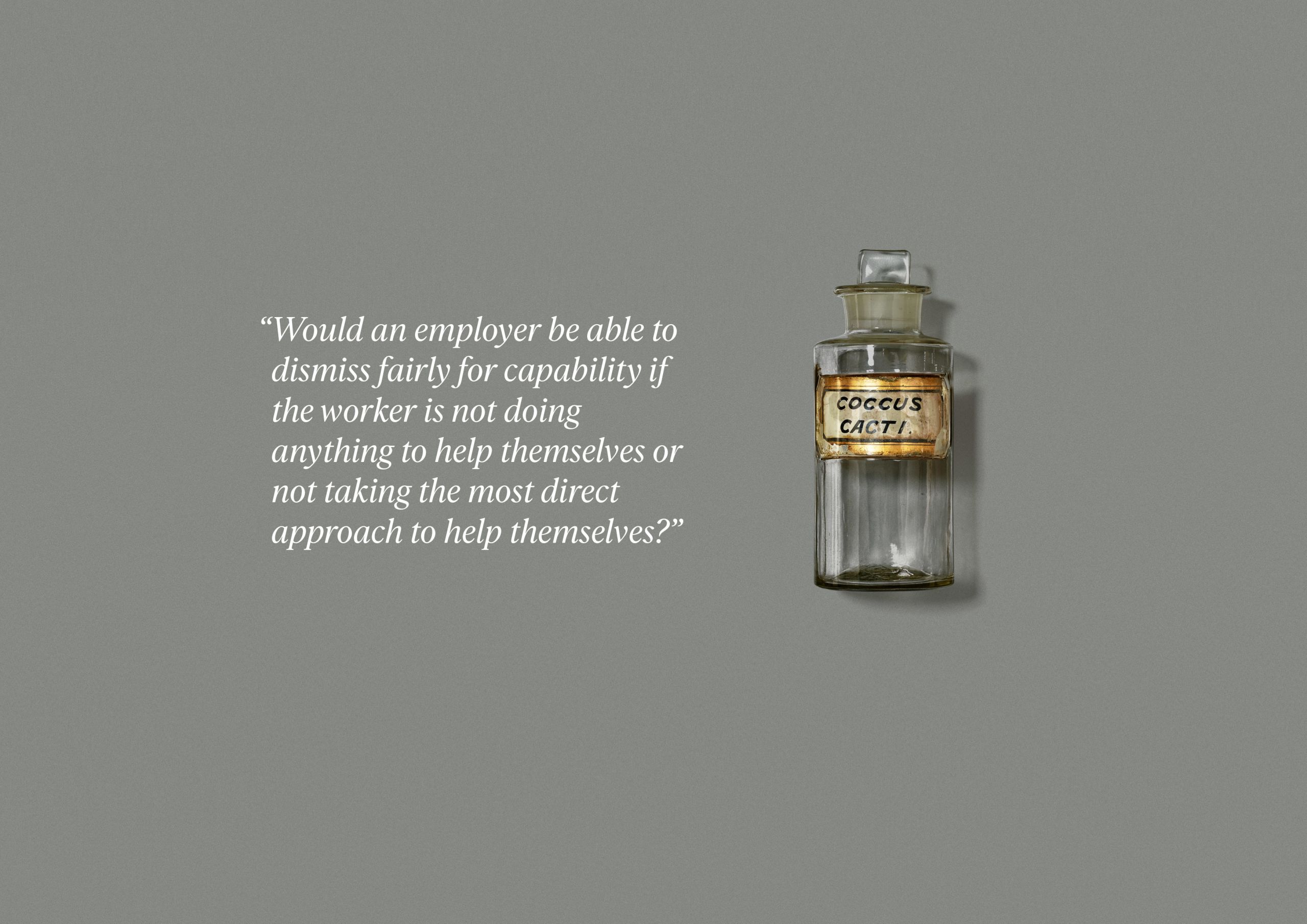
CONCLUSION

At all three roundtables, it was clear that there is a real desire to support menopausal people in the workforce. Participants were interested in, and saw the necessity of, raising awareness and normalising the menopause in the workplace.
As with any business drive for change, implementing menopause initiatives to create a truly supportive and inclusive workplace will require a commitment from businesses. The benefits to a business of normalising and supporting menopausal workers should be tangible.
Not only will such measures mitigate against legal claims and potentially assist to close the gender pay gap, but they should also reduce absenteeism, increase productivity and support the engagement and retention of a richly talented intergenerational workforce of the future.
Following a review of the information gathered at all three roundtables, we have set out below our key steps to creating a menopause friendly workplace:
- Consider the best framework to use to raise awareness within your organisation, ideally within your health and wellbeing agenda.
- Raise awareness of the menopause, its symptoms and effect for all staff. This will likely involve a combination of training and awareness raising initiatives through mediums such as newsletters, notice boards and surveys.
- Seek to normalise discussions regarding menopause in the workplace by ensuring that there is an open door culture and demonstrating management level commitment and understanding to discussing and supporting menopausal people.
- Review existing policies and frameworks to ensure that they are menopause friendly, for example, can flexible and agile working policies be introduced or used to better effect?
- Consider adaptions that could be made to the working arrangements and environment to support people going through the menopause, regardless of whether or not there is a legal obligation to make those adjustments.
- Work with occupational health and other health providers to ensure that they are specialised in assessing if a person is going through the menopause and providing menopause support. Look at what training they can offer your business.
- Create guidance and provide training on conducting Health and Safety risks assessments for those experiencing the menopause.
- Manage people who you believe may be going through the menopause and struggling at work in the same manner as any sensitive health issue. Address matters promptly in a supportive manner and seek medical input where required.
At Burness Paull, we secured funding through Impact Funding Partners and the Workplace Equality Fund to support a menopause project within our business which included raising awareness, training and working to breakdown any stigma associated with the menopause.
FOR ADDITIONAL INFORMATION OR
INTERVIEW REQUESTS PLEASE CONTACT:
Adam Shaw - Corporate Communications Manager
adam.shaw@burnesspaull.com
+44 (0)131 473 6060



